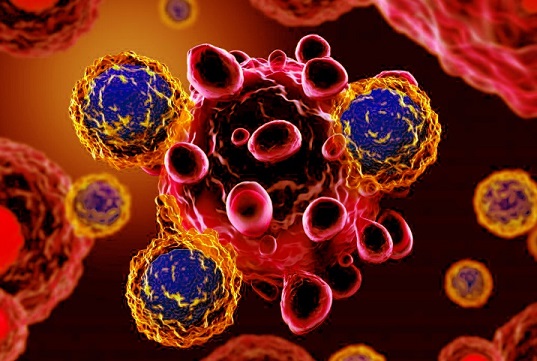Nikhil Prasad Fact checked by:Thailand Medical News Team Jan 22, 2025 2 months, 3 weeks, 5 days, 18 hours, 42 minutes ago
Medical News: Triple Negative Breast Cancer (TNBC) is a highly aggressive and challenging subtype of breast cancer that affects nearly 20% of all breast cancer patients worldwide. Unlike other types, TNBC lacks three critical receptors - estrogen, progesterone, and HER2 - that are often targeted in breast cancer treatments. This unique characteristic leaves patients with fewer treatment options, primarily relying on chemotherapy.
 UBR2 in Triple Negative Breast Cancer Offers New Hope for Immunotherapy
UBR2 in Triple Negative Breast Cancer Offers New Hope for Immunotherapy
Recently, researchers from the Affiliated Zhongshan Hospital of Dalian University, the Second Affiliated Hospital of Dalian Medical University, Huinan County People's Hospital, and Tianjin Medical University Cancer Institute & Hospital in China have unveiled promising findings about the role of a protein called UBR2. Their groundbreaking study provides insights into how UBR2 influences TNBC progression and its implications for enhancing immunotherapy outcomes.
The Role of UBR2 in TNBC
UBR2, an E3 ubiquitin-protein ligase, is a protein that has long been recognized for its role in cellular processes such as protein degradation. However, its potential impact on immune responses and cancer progression has remained elusive - until now. This
Medical News report delves into the researchers' discovery that UBR2 plays a significant role in shaping the immune environment within TNBC tumors.
Using advanced datasets and experiments, the team demonstrated how UBR2 promotes an immunosuppressive environment, making tumors more resilient to immune attacks. Specifically, UBR2 upregulates the expression of PD-L1, a protein that helps cancer cells evade immune responses by disabling T cells - the body's natural defenders against tumors.
Key Findings of the Study
-UBR2 and Immune Suppression
The study revealed that higher levels of UBR2 correlate with increased PD-L1 expression in TNBC cells. This finding was confirmed through in vitro and in vivo experiments, where researchers observed significant differences in tumor growth and immune cell behavior between TNBC cells with high and low UBR2 expression.
In mice models implanted with TNBC cells, those with elevated UBR2 showed larger tumor sizes and a greater presence of PD1-positive, exhausted T cells. These immune cells were less effective at attacking tumors, further supporting the role of UBR2 in creating an immune-suppressive microenvironment.
-UBR2 as a Predictive Marker
One of the study's most exciting discoveries is the potential of UBR2 as a predictive biomarker for immunotherapy. Patients with higher UBR2 levels were found to respond better to PD-L1/PD1 checkpoint inhibitor therapies. This finding suggests that assessing UBR2 levels could guide treatment plans and improve outcomes for TNBC patients.
-UBR2 Inhibition and Therapy Enhancement
The research
ers also explored ways to counteract UBR2's effects. By targeting UBR2 with specific inhibitors, they successfully reduced PD-L1 expression in TNBC cells, enhancing the immune system's ability to attack tumors. One promising compound identified was 11-oxo-mogroside V, which showed strong binding affinity to UBR2 and synergized effectively with anti-PD1 therapies in mice models.
Implications for Treatment
The findings from this study offer new hope for TNBC patients, particularly those with limited options due to the aggressive nature of the disease. By inhibiting UBR2, clinicians could potentially enhance the efficacy of existing immunotherapies, such as PD-L1 and PD1 checkpoint inhibitors. This approach not only bolsters the immune system's ability to fight cancer but also paves the way for more personalized treatment strategies.
Moreover, combining UBR2 inhibitors with immunotherapy could address a common challenge in cancer treatment: immune resistance. Tumors often develop mechanisms to evade immune attacks, rendering treatments less effective over time. UBR2-targeted therapies could disrupt this process, making tumors more susceptible to immune responses and prolonging the benefits of immunotherapy.
Future Directions
While the study provides compelling evidence of UBR2's role in TNBC, further research is needed to fully understand its mechanisms and explore its potential in clinical settings. Large-scale clinical trials will be essential to validate UBR2 as a biomarker and evaluate the safety and efficacy of UBR2 inhibitors in human patients.
Additionally, researchers are investigating the broader implications of UBR2 inhibition beyond TNBC. Since PD-L1 expression is a critical factor in many cancers, targeting UBR2 could have far-reaching benefits for other malignancies where immune evasion is a key challenge.
Conclusions
The discovery of UBR2's role in TNBC marks a significant milestone in cancer research. By demonstrating how UBR2 drives immune suppression and tumor growth, the study opens new avenues for treatment and offers hope to patients facing this aggressive disease. Importantly, the findings underscore the potential of combining UBR2 inhibitors with existing immunotherapies to achieve better outcomes.
For patients, this means a future where treatment is not only more effective but also tailored to their unique tumor characteristics. For researchers and clinicians, it represents an exciting opportunity to push the boundaries of cancer therapy and improve survival rates for one of the most challenging breast cancer subtypes.
The study findings were published on a preprint server and are currently being peer reviewed.
https://www.researchsquare.com/article/rs-5746807/v1
For the latest on Breast Cancer, keep on logging to Thailand
Medical News.
Read Also:
https://www.thailandmedical.news/news/new-hope-for-breast-cancer-involving-triggering-necroptosis-using-a-phytochemical-from-eomecon-chionantha
https://www.thailandmedical.news/news/mistletoe-and-cisplatin-team-up-against-breast-cancer
https://www.thailandmedical.news/news/triple-viral-infections-and-breast-cancer
https://www.thailandmedical.news/news/breaking-new-study-shows-even-progestin-only-birth-control-pills-or-patches-increase-risk-of-breast-cancer
https://www.thailandmedical.news/news/male-breast-cancer-cases-rising-not-among-trans-but-rather-among-body-builders
